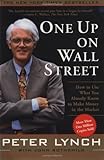Uncategorized
I recently finished reading the famous “#1 Money Manger – Time” Peter Lynch‘s best seller One Up On Wall Street – How to use what you already know to make money in the market. It is exactly 302 pages, but literally in the last few chapters he summarises pretty much all what you need to learn from his book in about 30 bullet points. So I have taken the liberty to post it on to save you reading that 300 pages, as today time is very limited and I wouldn’t mind it if someone had summarised the key points of the book for me.
This book is all about stock picking and using your own local expertise to give you that edge in picking those 10 baggers (1000% ROI)!
Understand the nature of the companies you own and the specific reasons for holding the stock. (“It is really going up” doesn’t count.)
By putting your stocks into categories you’ll have a better idea of what to expect from them (categories are Slow Growers, Stalwarts, Cyclicals, Fast Growers, Turnarounds, Asset Plays)
Big companies have small moves, small companies have big moves.
Consider the size of a company if you expect it to profit from a specific product.
Look for small companies that are already profitable and have proven their concept can be replicated.
Be suspicious of companies with growth rates of 50 to 100 perfect a year.
Avoid hot stocks in hot industries.
Distrust diversifications, which usually turn out to be diworsefications.
Long shots almost never pay off.
It’s better to miss the first move in a stock and wait to see if a company’s plans are working out.
People get incredibly valuable fundamental information from their jobs that may not reach the professionals for months or even years.
Separate all stock tips from the tipper, even if the tipper is very smart, very rich and his or her last tip went up.
Some stock tips, especially from an expert in the field, may turn out to be quite valuable. However, people in in the paper industry normally give out tips on drug stocks, and people in the health care field never run out of tips on the coming takeovers in the paper industry.
Invest in simple companies that appear dull, mundane, out of favour, and haven’t caught the fancy of Wall Street. (or local equivalent)
Moderately fast growers (20 to 25 percent) in non-growth industries are ideal investments.
Look for companies with niches.
When purchasing depressed stocks in troubled companies, seek out the ones with the superior financial positions and avoid the ones with the loads of bank debt.
Companies that have no debt can’t go bankrupts.
Managerial ability may be important, but it’s quite difficult to assess. Bases your purchases on the company’s prospects, not on the president’s resume or speaking ability.
A lot of money can be made when a troubled company turns around.
Carefully consider the price-earnings ratio. If the stock is grossly overpriced, even if everything else goes right, you won’t make any money.
Find a story line to follow as a way of monitoring a company’s progress.
Look for companies that consistently buy back their own shares.
Study the divided record of a company over the years and also how its earnings have fared in past recessions.
Look for companies with little or no institutional ownership.
All else being equal, favour companies in which management has a significant personal investment over companies run by people that benefit only from their salaries.
Insider buying is a positive sign, especially when several individuals are buying at once.
Devote at least an hour a week to investment research. Adding up your dividends and figuring your gains and losses doesn’t count.
Be patient. Watched stock never boils.
Buying stocks based on stated book value alone is dangerous and illusory. It’s real value that counts.
When in doubt, tune in later.
Invest at least as much time and effort in choosing a new stock as you would in choosing a new refrigerator.
Copyright (c) Peter Lynch, 1999. All rights reserved.
If you are interested in learning more you can always purchase the book (below).


One Up On Wall Street : How To Use What You Already Know To Make Money In The Market
Hope you enjoyed Peter Lynch’s One Up On Wall Street 300 pages in 30 seconds.




